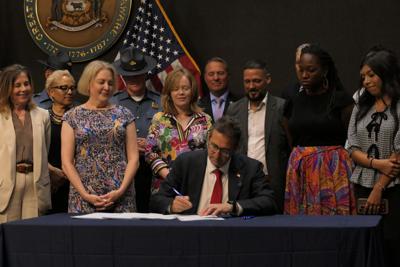DELAWARE - Delaware Gov. Matt Meyer signed House Bill 182 into law on Monday, prohibiting local law enforcement agencies from entering into agreements with federal immigration authorities to enforce immigration violations or share related data.
The bill was sponsored by Rep. Mara Gorman, with Rep. Claire Snyder-Hall of District 14 and Sen. Russ Huxtable of District 6 serving as co-sponsors.
The law prohibits local law enforcement agencies in Delaware from entering into 287(g) agreements with U.S. Immigration and Customs Enforcement (ICE), which allow officers to enforce federal immigration laws. One such agreement was entered into by the Camden Police Department in April but was withdrawn following community pushback.
"Every Delawarean has the fundamental right to live in a secure, respectful, and inclusive community," Meyer said. "That's why we're taking meaningful steps to address outdated laws and private‑enforcement loopholes. These reforms are about recommitting to being a state of neighbors and working toward better, safer communities for Delaware residents."
Candy Sebastián González, whose family is from Guatemala, said she believes the law could ease concerns in the immigrant community.
"I think it will be so relieving knowing that police officers can't act as an ICE agent and people will be more calm going outdoors knowing that they can't do the same things as ICE will to them, and have more trust in the local police officers," González said.
Others, like Larry Mayo of Milton, voiced opposition to the new law.
"To be here illegally is a federal crime, so ICE has law enforcement authority over that crime, and for the states to try to circumvent that is... stupid," Mayo said.
According to the ACLU of Delaware, the state joins New Jersey, Connecticut, and Illinois in banning this type of agreement.
Also signed Monday were House Bill 153, which removes the ability for private individuals to make arrests without statutory authority; House Bill 142, which eliminates provisions related to warrantless arrests for out-of-state felonies; and House Bill 152, which expands the state's impersonation statute to include federal officers.







